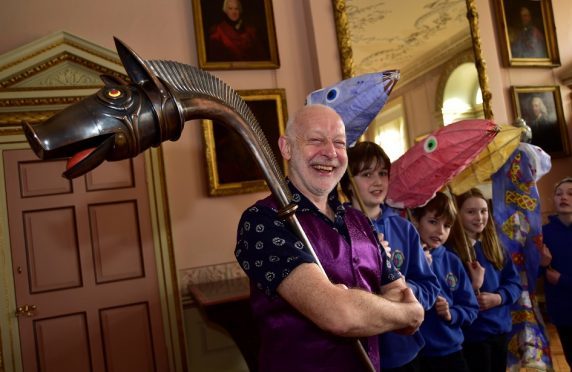Jamie Ross
North-east pupils gave a big bosie yesterday to a brand new festival, designed to celebrate Doric and its culture.
And, for those unfamiliar with the dialect, that means a loving hug.
The Provost of Aberdeenshire, Hamish Vernal, representatives from the University of Aberdeen, artists and musicians were invited to Duff House for the announcement.
The new event was revealed while Aberdeenshire Council progresses with plans to teach Doric in classrooms and encourage youngsters to begin learning more about their heritage.
The proceedings also saw the unveiling of replica carnyx horns – the Deskford horn and Tintignac horn.
They were played by world-renowned musicians John Kenny and his son, Patrick.
The original animal-headed instruments, dating from between 80 and 200AD, were found near Banff and the Corréze region of France, and were played during times of war to inspire or terrify their listeners.
Speaking afterwards, Mr Vernal said: “By announcing a joint statement of ambition with the University of Aberdeen, we are recognising traditional song and music of the area, along with Doric, form a special part of who we are and are a unique asset for promoting a sense of community and attracting visitors to the area.”
Principal of the University of Aberdeen, Professor, Sir Ian Diamond, added: “Pride in our sense of place is incredibly important and we’re delighted to be able to work with the council, in partnership, to develop initiatives around the language, dialect, culture and everything that is so wonderful about this part of the world.”
Further details about events expected to form part of the Doric festival have not yet been confirmed, although proposals to begin promoting it more have already been hailed by Scottish language entertained Robert Lovie.
Mr Lovie said local people should be “proud” of their roots and added that the idea of introducing Doric to classrooms was “wonderful”.
He suggested that the move could even lead to a renaissance in Scottish language literature.
Last night, councillor Alison Evison, the chairwoman of the council’s education committee, added: “This will help to highlight the unique characteristics of our towns and villages and support work to develop local tourism.”
